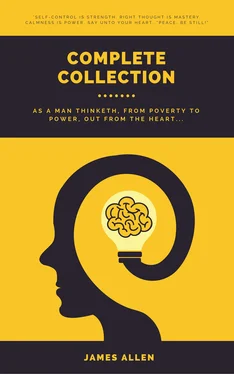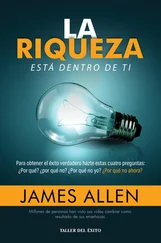Why, then, do I grow angry? why do I resent, retaliate, and engage in bitter thoughts? Is it not because my pride is piqued or my vanity wounded or my selfishness thwarted? Is not because my blind animal passions are aroused and allowed to subdue my better nature? Seeing that I am hurt by another person’s attitude towards me because of my own pride or vanity or ungoverned and unpurified passions, would it not be better to look to the wrong in myself rather than the wrong in another, to get rid of pride and vanity and passion, and so avoid being hurt at all?
By such self-questionings and their elucidation in the light of mild thoughts and dispassionate conduct a man, gradually overcoming passion and rising out of the ignorance which gave rise to passion, will at last reach that blessed state in which he will cease to see evil in others, and will dwell in universal good-will and love and peace. Not that he will cease to see ignorance and folly; not that he will cease to see suffering and sorrow and misery; not that he will cease to distinguish between acts that are pure and impure, right and wrong, for, having put away passion and prejudice, he will see these things in the full, clear light of knowledge, and exactly as they are; but he will cease to see anything-any evil power- in another which can do him injury, which he must violently oppose and strive to crush, and against which he must guard himself. Having arrived at right understanding of evil by purging it away from his own heart he sees that it is a thing that does not call for hatred and fear and resenment but for consideration, compassion, and love.
Shakespeare through one of his characters says: “There is no darkness but ignorance.” All evil is ignorance, is dense darkness of mind, and the removal of sin from one’s mind is a coming out of darkness into spiritual light. Evil is the negation of good, just as darkness is the negation, or absence of light, and what is there in a negation to arouse anger or resentment? When night settles down upon the world who is so foolish as to rail at the darkness? The enlightened man, likewise, does not accuse or condemn the spirtual darkness in men’s hearts which is manifested in the form of sin, though by gentle reproof he may sometimes point out where the light lies.
Now the ignorance to which I refer as evil, or as the source of evil, is two-fold. There is wrong-doing which is committed without any knowledge of good and evil, and where there is no choice - this is unconscious wrong-doing. Then there is wrong-doing which is done in the knowledge that it ought not to be done - this is conscious wrong-doing; but both unconscious and conscious wrong-doing arise in ignorance-that is, ignorance of the real nature and painful consequences of the wrong-doing.
Why does a man continue to do certain things which he feels he ought not to do? If he knows that what he is doing is wrong where lies the ignorance?
He continues to do those things because his knowledge of them is incomplete. He only knows he ought not to do them by certain precepts without and qualms of conscience within, but he does not fully and completely understand what he is doing. He knows that certain acts bring him immediate pleasure, and so, in spite of the troubled conscience which follows that pleasure, he continues to commit them. He is convinced that the pleasure is good and desireable, and therefore to be enjoyed. He does not know that
pleasure and pain are one, but thinks he can have the one without the other. He has no knowledge of the law which governs human actions, and never thinks of associating his sufferings with his own wrongdoing, but believes that they are caused by the wrong- doing of others or are the mysterious dispensations of Providence, and therefore not to be inquired into or understood. He is seeking happiness, and does those things which he believes will bring him most enjoyment, but he acts in entire ignorance of the hidden and inevitable consequences which attach to his actions.
Said a man to me once who was the victim of a bad habit: “I know the habit is a bad one, and that it does me more harm than good” I said: “ If you know that what you are doing is bad and harmful why do you continue to do it?” And he replied: “Because it is pleasnt, and I like it.
This man, of course,did not really know that his habit was bad. He had been told that it was, and he thought he knew or believed it was, but in reality he thought it was good, that it was conducive to his happiness and well-being, and therefore he continue to practise it. When a man knows by experience that a thing is bad, and that every time he does it he injuries body or mind, or both; when his knowledge of that thing is so complete that he is accquainted with its hole train of baneful effects, then he cannot only not do it any longer, he cannot even desire to do it, and even the pleasure that was formerly in that thing becomes painful. No man would put a venomous snake in his pocket because it is prettily coloured. He knows that a deadly sting lurks in those beautiful markings. Nor, when a man knows the unavoidable pain and hurt which lie hidden in wrong thoughts and acts, does he continue to think and commit them. Even the immediate pleasure which formerly he greedily sought is gone from them; their surface attractiveness has vanished; he is no longer ignorant concerning their true nature; he sees them as they are.
I knew a young man who was in business, and although a member of a church, and occupying the position of voluntary religious instructor, he told me that it was absolutely necessary to practise lying and deception in business, otherwise sure and certain ruin would follow. He said he knew lying was wrong, but while he remained in business he must continue to do it. Upon questioning him I found, of course, that he had never tried truth and honesty in his business, had not even thought of trying the better way, so firmly convinced was he that it was not possible for him to know whether or not it would be productive or ruin. Now, did this young man know that lying was wrong? There was a preceptial sense only in which he knew, but there was a deeper and more real sense in which he did not know. He had been taught to regard lying as wrong, and his conscience bore out that teaching, but he believed that it brought to him profit, proesperity and happiness, and that honesty would bring him loss, poverty, and misery - in a word, he regarded lying, deep in his heart, as the right thing to do, and honesty as the wrong practice. He had no knowledge whatever of the real nature of the act of lying: how it is, on the instant of its committal, loss of character, loss of self-respect, loss of power, usefulness, and influence, and loss of blessedness; and how it unerrinngly leads to loss of reputation and loss of material profit and prosperity. Only when such a man begins to consider happiness of others, prefers to embrace the loss which he fears rather than clutch at the gain which he desires, will he obtain that real knowledge which lofty moral conduct alone can reveal; and then, experiencing the greater blessedness, he will see how,
Конец ознакомительного фрагмента.
Текст предоставлен ООО «ЛитРес».
Прочитайте эту книгу целиком, купив полную легальную версию на ЛитРес.
Безопасно оплатить книгу можно банковской картой Visa, MasterCard, Maestro, со счета мобильного телефона, с платежного терминала, в салоне МТС или Связной, через PayPal, WebMoney, Яндекс.Деньги, QIWI Кошелек, бонусными картами или другим удобным Вам способом.












